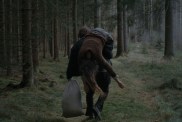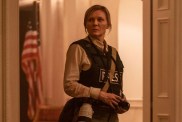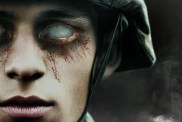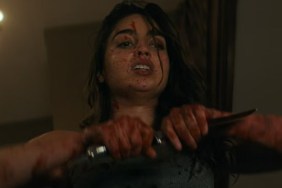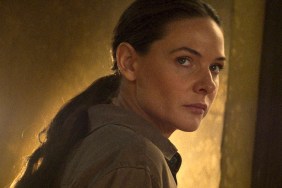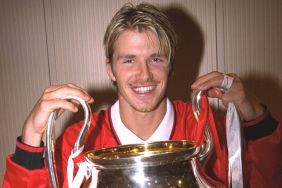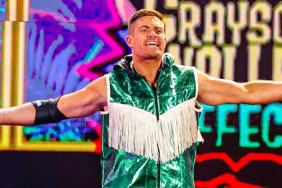The last time ComingSoon.net spoke to filmmaker David Gordon Green, it was for his excellent character drama Snow Angels, a movie which tragically very few people saw in theaters. (You can read that interview here.) At the time, we spoke to him briefly about his upcoming studio debut, the action-comedy Pineapple Express penned by Seth Rogen and Evan Goldberg of Superbad fame, a movie which will ultimately be seen by millions more viewers than most of Green’s movies put together.
In the movie, Rogen plays process-server Dale Denton, who ends up on the run from thugs and gangsters along with his pot dealer Saul (James Franco) when he witnesses a murder. Indeed, it’s a very different movie than we’ve seen from Green in the past, being first and foremost a comedy but one that harks back to Green’s underrated ’70s homage Undertow. Many have wondered how Green would go from being one of the pioneers of indie filmmaking in the 21st Century to doing such a high-profile studio movie, and one can expect that those who like Pineapple Express will be going back to check out some of Green’s former work especially All the Real Girls, the acting debut of Danny McBride, who arguably steals Pineapple Express from the better-known leads.
So last weekend, ComingSoon.net was at Comic-Con, taking a little break from the onslaught of footage and interviews being hurled at us to sit down and prepare some questions for Green, when we were asked to speak with the director a little earlier than planned, so the interview is a little more “freestyle” and not as “preconceived” (as he put it) than our norm, which hopefully ended up being a good thing.
ComingSoon.net: So the last time we spoke, you talked about how you met Judd Apatow on the set of “Knocked Up” and “Superbad,” so at what stage in development was this project when you were on the set and they approached you about it?
David Gordon Green: I think they were on their second draft of the script. I think it was on the set of “Knocked Up” that I visited and met with them all about it. Let me see, I met them on “Knocked Up” and then two weeks later I got the script, that’s how it was, and then went to the set of “Superbad” and watched how they were working, Seth and Evan as writers and producers, and just really had a great affinity and an affection for the way they were putting a project together. It really was just a matter of bringing some of my sensibilities to their sensibilities, so it was a pretty perfect fitsome of their team, some of my team.
CS: They’ve created a very specific way of working, especially Judd and Adam McKay said the same thing, where they basically throw out lines and improvise stuff on set. Since you’re more of the director, you can’t do that, but do Seth and Evan do that on set while you’re filming?
Green: Everybody had ideas, but all of my movies are highly improvised, so I’ll do that even on the dramatic films a lot of times. I just really like to work with actors who have creativity and energy and don’t need scripts, because they know their characters so well, so they don’t need the boundaries.
CS: What kind of shape was the script in when you got it? Was the story in place with beginning, middle and end and they knew exactly where it was going to go?
Green: Yeah, but again, it being so highly improvised, there was a different ending, like we improvised that ending. “Well, let’s see what happens if we just turn a camera on these guys at a coffee shop afterwards and they recap the movie.” That was just an idea, that wasn’t in the script. It ended at the barn initially, so it’s just all very loose.

CS: I’d guess when you’re doing your own independent movies, they’re a little more freeing because you don’t have to answer to a studio, and you’d think that it would be hard to do that sort of thing when making this kind of movie.
Green: No, perfect transition because it was a supportive studio that didn’t bother us about things, and they really trusted our instincts. It was really pretty awesome, and in a way, I had more freedom, because I wasn’t limited on the film I had to burn and the budget was substantial enough to do what we needed to do, so I could put all my creativity into working on the performance of this thing.
CS: Last time, we talked a bit about doing genre movies, and “Undertow” was very genre-based. This one has a bit of the stoner comedy, buddy action comedy, definitely some genres that are new to you. Did you watch other movies like that to get into the right head to make this?
Green: Yeah, we talked a lot about “Midnight Run” and “The Blues Brothers” and “Running Scared,” the Billy Crystal and Gregory Hines movie, as well as like “Stir Crazy” and some of the classic buddy movies. One of my favorites is a movie called “The Gravy Train” from the early ’70s. It’s just great and fresh chemistry and it’s all about being alive.
CS: Was some of the music in this influenced by those movies as well?
Green: Yeah, Graeme Revell was our composer and I just played him music from “48 Hours” and “Beverly Hills Cop” and “The Warriors” and movies that had really synthesizer-heavy theme songs, and kind of came up with the score that way that had a little ’80s retro feel to it.
CS: Did you get him on board fairly early or was it after you finished filming?
Green: It was after we’d shot it, and we kind of had an idea for some of the songs. We wanted Belle Biv Devoe and Shaquille O’Neal music in there, so we had some pretty eclectic ideas about where we wanted to go with the music and then an idea to bring a score that had that sensibility just seemed kind of natural to what we’d made.
CS: Did you ever see the movie as a period piece or was it just a matter of these characters living in the past?
Green: I just wanted it to be timeless. I wanted it to be a movie that you can’t really quite date. It’s not so specifically contemporary that it’ll be out of style next year. It’s kind of designed to already be out of style, so we have some modern devices: cell phones and everything about what they’re watching on TV, what they’re talking about, any pop culture references are twenty years old.
CS: I wanted to talk about your relationship with Danny McBride who appeared in “All the Real Girls” but who is really popping right between this movie, “Tropic Thunder” and his upcoming HBO series in development. Can you talk about bringing him onto this? I mean, who was attached when you were brought on to direct this besides Seth?
Green: Seth and James were on board. They’d actually filmed a table read to see if the script was working to see if it was a project they wanted to get serious about. (Danny) is actually the one who introduced me to these guys. After he’d done “The Foot Fist Way”Judd and Seth were big fans of that movieso they invited him out to meet and then they talked to him a little bit about this project as an idea they had, and he threw my name in there and said, “Hey, you might want to meet with David” and they were familiar with my dramatic work, and they thought that was so weird it might work. I really have to credit him with that introduction.

CS: While this is a comedy, there’s also a lot of violence, which is done in a very realistic and graphic way, but there’s also the jokes in between. I was curious about trying to find the right balance of those things so you feel they’re in danger but still keep it light.
Green: It was interesting and we were worried about that at first, but we really just followed our instincts about what movie we wanted to see, and started putting that in front of an audience and the more we pushed the audience, the more they responded to it. The gore we added and the strange humor we added, the weirder the movie became, the more positive the reaction became, so there was really every incentive to maximize its strange qualities and non-traditional qualities and really follow our initial instincts of what that balance would be.
CS: When I saw it in New York, it was with what I guess some would call an “urban” audience and I was surprised how well it went over. The audience was just loving it.
Green: Really? Great! Love that, that’s good to hear. You know, it’s interesting because I watched it a couple nights ago in New York for the first time to see an East Coast reaction, and it’s strange that the rhythm of humor and sense of humor is a little different on both coasts. You’ll see some little textures to the differences of how they respond to it.
CS: What was the gameplan for shooting the action sequences? How much of it was written in the original script and described on what happens in the car chase?
Green: No, because we were given a comedy budget for the movie, and so we really didn’t know what we were able to pull off until we started asking favors. I met with people I was passionate about working with, the stunt coordinator that had done some wonderful movies and the guys that did the car chase for us were the guys that did the “Bourne Identity” and had done some pretty amazing car stunts. So getting people whose work I admired on board was the first step and then trying to maximize every dollar so we could turn what on the script was just a couple sentences or something more manageable, we wanted to make it outrageous and push what the potential would be.
CS: Where was the location where you did all the stuff in the barn as that was a pretty cool location?
Green: Yeah, it was about an hour outside L.A. We built this barn up on a mountain. The underground was a different set, that was a newspaper printing place where we got the roof on fire when we set the bomb off and that turned into quite a debacle on Thursday night.
CS: Doing that kind of stoner comedy, you knew this was going to be R-rated and there was no way around that. Has anyone ever suggested that you had to cut back on anything or did everyone knew that this is what it was and that’s that?
Green: Again, everybody was just so supportive, it’s crazy. There is a thing that for the version that’s going to be released in the U.K., you can’t have minors and marijuana or you can, but then noone under 18 will be allowed to go see the movie, so we did make a compromise for the British version of it, which is somewhat frustrating but I guess their censorship was a lot more severe there.
CS: So you had to cut the scene where they’re selling pot to the school kids?
Green: Or we just massaged the scene so that implies more than it shows.

CS: At this point, after doing this movie, do you think you can go back to doing an indie movie? I imagine this budget was more than all your other movies combined.
Green: Oh, yeah, easily. Times five. So yeah, the idea is just to do what my heart tells me what to do next and never become stale, and always try new things and new challenges and in some ways, spending more money is a challenge and in other ways, being inventive with a few dollars is more of a challenge. I was at a point with this movie where I just wanted to recharge my dramatic batteries and now I feel like I’ve exercised (or maybe he said “exorcised”?) a lot of the comedic and action impulses, so I’m developing things from an animated TV series to a huge Arctic war movie and a couple comedies and horror films. I write things that are all over the place and just see kind of what opportunity seems to present itself.
CS: What’s going on with some of these scripts you’ve been developing like “Suspiria” and “Goat”? Are you writing all of these for yourself to direct?
Green: “Goat” is for another director, this director Jeff Nichols who made this movie last year called “Shotgun Stories,” he’s going to direct that, and “Suspiria” is a script that’s finished and we’re out trying to find the right supportive financial institution that wants to take a risk and make a really bold, distinctive and unique horror film. It’s not the obvious… it doesn’t slip naturally into the niche market of contemporary movies. I think it has the potential of being classic and a lot more artistically inclined than some of the contemporary horror stuff.
CS: Was that a producer who optioned the property and brought you on board? Obviously, there isn’t a studio involved at this point.
Green: It’s an Italian production company that is developing it. It will be a European production and doubtfully have any American ties to it.
CS: Theoretically, you’d make the movie and then shop it around after you finish it?
Green: Yeah, probably do something like that. We’re trying to find financing that would take the risk with us but it’s another one that takes a lot of risks, let’s say, as you can imagine from the original.
CS: Yeah, I can’t even imagine someone trying to remake it, so I guess that’s the challenge. Have you started looking at the cast or you might want to be in it?
Green: Yeah, we have the cast coming together. Nothing I can say yet, but it’s pretty exciting.
CS: Could that theoretically be your next movie?
Green: It could be. There’s also a movie that Danny McBride wrote called “Your Highness.” It’s a medieval movie about Danny that we got set up and we’re looking to do a rewrite on that right now. It’s about a prince in the Middle Ages who fights dragons. Just Danny and a world of creatures and the possibilities there would be great because I haven’t really worked in some of the special effects that could teach me. A few other things.
CS: It’s amazing how Danny is everywhere now because I remember seeing him in “All the Real Girls” but he hasn’t been doing that much since then. Why do you think everyone is suddenly noticing him?
Green: I think “Foot Fist Way” really made its way around the industry and it had a small release here recently but before that, it seemed like everyone in town got a hold of it and it was like a splash of water in the face to what comedy could be. He breaks all the rules and that’s what we love about him.
Pineapple Express opens nationwide on Wednesday, August 6. Check out CS video interviews with Seth Rogen and James Franco and stay tuned for a two-fisted interview with the one and only Danny McBride!
